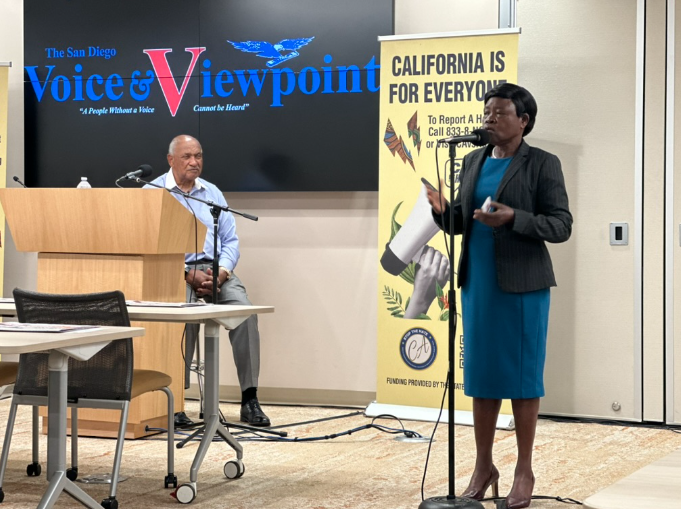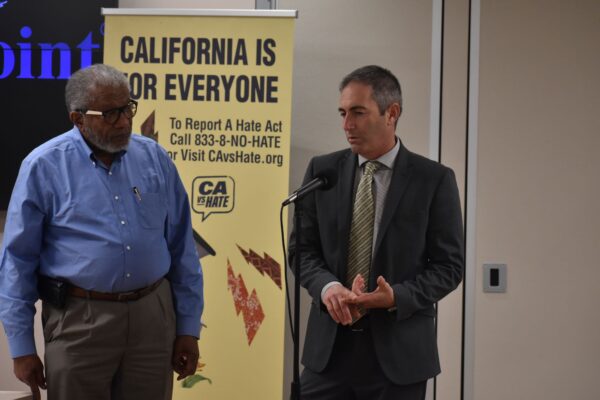
By Emily Kim Jenkins, Contributing Writer
The room was buzzing with hushed conversation as attendees filed in. The Voice & Viewpoint’s yellow banners declared “California is for everyone” in bold print surrounding a podium where publisher Dr. John Warren sat, preparing to moderate.
On May 23 at the Southeastern Live Well Center, representatives of law enforcement agencies and community-based organizations (CBOs) gathered to discuss how LEAs are handling reported acts of hate. The theme of the event was Law Enforcement: Identifying Victims of Hate and Finding Healing Solutions. The conversation also continued discussions from April’s Town Hall.
Jurisdictions from top down were covered, with representatives from federal agencies such as the FBI, the District Attorney’s office and the local San Diego Police Department present. Community representatives from groups such as Little Saigon San Diego and the Haitian Bridge Alliance also were also present.
Dr. Warren opened the night by highlighting some of the work that the Voice & Viewpoint has done to raise awareness of the challenges of inequity across the county, as the Town Hall coincided with the publication of the sixth annual Minority Health special issue. One of these challenges, naturally, is combating hate.
The conversation kicked off with thorough introductions from the LEAs present. FBI representatives Garrett Frank and Arnesha Bahn shared how reports are handled through their offices, then SDPD officer Lieutenant Jason Weeden shared more on the state of hate affairs in San Diego, including the stunning statistic of 73 new cases of reported hate crimes year over year.

Deputy District Attorney Leon Schorr of the San Diego District Attorney’s office emphasized the importance of identifying motivation to hold perpetrators accountable.
“We all know if you rob a bank, you’re motivated by, potentially, money,” Schorr said. “But when you’ve got a hate crime [or incident]… you want to look at the actions of the individual and all the other circumstances.”
Both Schorr and Frank mentioned the importance of documenting and reporting hate incidents so that, if a perpetrator does commit a crime, there is a trail to bolster the motivation.
“Don’t feel like just if you didn’t report right away, that’s your last opportunity,” Schorr added. “Don’t think you need to decide whether or not it is a hate crime or a hate incident. If it’s anywhere close, if you’re thinking this might be a hate crime or hate incident, that’s enough! … You should be reporting and we want to hear and document it.”
When Elizabeth Lou, Executive Director of the Nile Sisters Development Initiative, began to speak, the room was completely still. A refugee herself, she spoke about the difficulties that English language learners and those from other cultures face in identifying hate.
”It is so very sophisticated. The way they say it is so very sophisticated,” Lou said. “Sometimes… you will not even know that a person hates you.”
She used the examples of passive aggressive speech and microaggressions, which require an understanding of American culture and an advanced understanding of English to understand their insincerity.
“The great thing about the San Diego area is that we [federal, state and local agencies] work very well together,” Frank said. “The main thing is just report [acts of hate] because we will figure out a way.”
This resource is supported in whole or in part by funding provided by the State of California, administered by the California State Library in partnership with the California Department of Social Services and the California Commission on Asian and Pacific Islander American Affairs as part of the Stop the Hate program. To report a hate incident or hate crime and get support, go to CA vs Hate.

